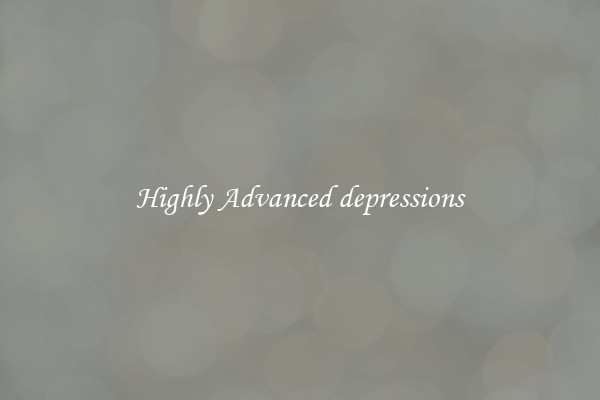Highly Advanced depressions
Title: An Insight into Highly Advanced Depressions: Navigating the Depths of Mental Turmoil

Introduction:
Depression, a common mental health disorder affecting millions of people worldwide, is often characterized by prolonged feelings of sadness, hopelessness, and disinterest. While most individuals experience varying degrees of depression, there exists a subset of the population that endures a more sinister and intensified form of this condition, known as Highly Advanced Depressions. This profound and complex manifestation plunges individuals into the depths of mental turmoil, presenting unique challenges in terms of diagnosis, treatment, and overall well-being.
Understanding Highly Advanced Depressions:
Highly Advanced Depressions encompass an array of depressive disorders such as major depressive disorder with psychotic features, treatment-resistant depression, melancholic depression, and bipolar disorder. What distinguishes these conditions is the severe and unrelenting nature of the symptoms, which often include persistent suicidal thoughts, debilitating feelings of guilt, loss of appetite, disturbed sleep patterns, and an inability to find pleasure in activities formerly enjoyed.
The Implications:
Individuals battling Highly Advanced Depressions face a plethora of challenges that extend beyond the realm of ordinary depression. These individuals may encounter more difficulties in seeking appropriate treatment due to the complexity of their condition and the limitations of traditional therapeutic approaches. Additionally, their symptoms often have a profound impact on interpersonal relationships, professional life, and overall quality of life, making it even more challenging to function in day-to-day activities.
Treatment Approaches:
Addressing Highly Advanced Depressions necessitates a comprehensive and personalized treatment plan involving a multidisciplinary team of mental health professionals. Therapeutic interventions often include a combination of medication, psychotherapy, and electroconvulsive therapy (ECT) for severe cases. ECT, a procedure that stimulates the brain with electric currents while the patient is under anesthesia, has shown promising results in instances where conventional treatment methods have proven ineffective.
Alternative treatment modalities, such as transcranial magnetic stimulation (TMS) and ketamine infusion therapy, are also being explored and have shown promising results in managing treatment-resistant depression. These advanced techniques aim to target specific areas of the brain associated with depression, providing new hope for those who have exhausted conventional treatment options.
Support and Understanding:
It is crucial for friends, family, and society as a whole to develop a deeper level of empathy and understanding towards individuals suffering from Highly Advanced Depressions. Stigma surrounding mental health often exacerbates the challenges faced by these individuals, leading to increased feelings of isolation and inadequacy. Promoting open dialogue, educating others about the complexities of these conditions, and offering support can go a long way in helping those affected by Highly Advanced Depressions feel valued and understood.
Conclusion:
Highly Advanced Depressions plunge individuals into a reality where the depths of their mental turmoil appear insurmountable. By acknowledging the existence of these conditions and exploring innovative treatment approaches, we can offer hope and a ray of light to those grappling with these profound depressive disorders. Empathy, support, and a combination of advanced therapeutic interventions can aid in the journey towards healing and recovery, allowing individuals to reclaim their lives and find solace amidst the darkness.

View details

View details

View details

View details








